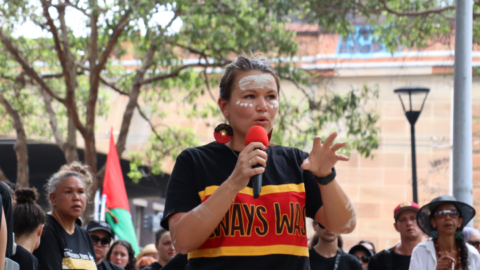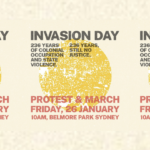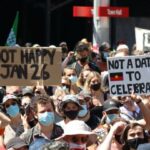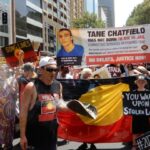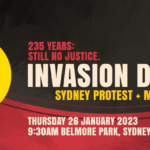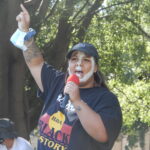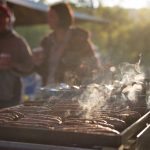Invasion Day 2024 Highlighted the Floundering Western Imperialist Paradigm
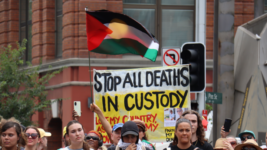
“Twenty twenty-four is a very peculiar year for our mob,” said Wiradjuri Badu Island yinaa Lynda-June Coe on opening the Invasion Day rally in Gadigal-Sydney on Friday. “We have just come through a referendum process, which sought to recognise our people in the ailing constitution.”
“I belong to Wiradjuri. I have my own constitution,” the activist and writer assured.
The same event in Sydney’s Belmore Park 12 months prior rejected the proposal to hold a national vote on establishing a constitutionally-enshrined Voice to parliament, as it asserted it was a divisive process that would result in a weak advisory body with power to provide nonbinding decisions.
Despite this rejection of the Voice, First Nations people were subjected to a months-long campaign last year, involving the 97 percent non-Indigenous portion of the population debating whether what the opposition presented as an “all-too powerful” representative body should be established.
And sixty percent of the population voted against the Voice.
The result came at almost the same moment the Albanese government gave unbridled support to Israel in its genocidal attack on Palestinians, which revealed a settler colonial state supporting another in brutal expansion, not a government concerned with the welfare of those it dispossessed.
“Genocide has been operating well for the last two centuries,” Coe made clear regarding the local situation. “It is a sophisticated and calculated genocide, in that the structures of Australia inherently perpetrate and inflict violence and harm against communities, and they do it under neoliberalism.”
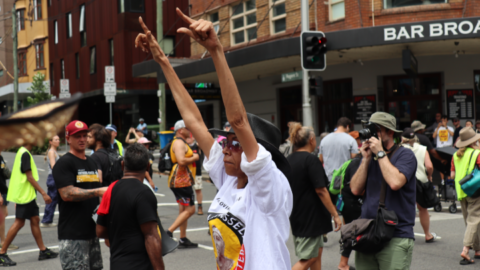
The most incarcerated
“They use their police force as their dogs, as their hounds, to attack our people. They use the out-of-home care system to continuously remove our kids,” Coe told the thousands gathered at 10 am in the park on 26 January. “They continue to refuse to give us our land back. We are dispossessed.”
“We are the most incarcerated, impoverished people on the planet,” she continued, adding defiantly that “we ain’t going nowhere”.
Of the 41,929 adult prisoners in the Australian prison system in June 2023, 13,852 were First Nations people. This means 33 percent of the prisoner population are Aboriginal and Torres Strait Islander peoples, whilst only accounting for less than 3 percent of the continent’s overall populace.
These stark disparities are not getting any better, however. Indeed, in 1991, Indigenous peoples only accounted for 14 percent of the population inside. And that year is significant as in April, the Royal Commission into Aboriginal Deaths in Custody handed down its compressive 339 recommendations.
The Australian government’s Death in Custody count outlines that since the Royal Commission, 558 First Nations deaths in custody have occurred. This is a situation that is not abating, and neither are circumstances which see no prison or police officer ever convicted in relation to such deaths.
As Dunghutti death in custody activist Paul Silva told Sydney Criminal Lawyers in the lead up to Friday’s protest, “I have always said Aboriginal deaths in custody is like the Stolen Generations and the First Fleet arrival, but instead of mass murdering people, they’re doing it behind closed doors.”
Sorry means you don’t do it again
Bundjalung Widubul-Wiabul woman Vanessa Turnbull-Roberts addressed the genocidal intent of the “war on children” that regimes are inflicting, including on the Rohingya in Myanmar, on the West Papuans, the mass killing of Palestinian kids by Israel, as well as that in “so-called Australia”.
“Child protection: I call it family policing. It is a modern slavery because our children get stolen by the professional kidnappers through the use of bias, prediction and surveillance,” the human rights lawyer made certain. “Bias, prediction and surveillance.”
“‘I am biased because you are black and I am going to take your child,’” Turnbull-Roberts continued. “I am going to predict that you can’t raise your child, and then I am going to take your child, put it in a system, break your kinship system and say, ‘Hey, this system works better than yours’”.
The Productivity Commission report 2024 outlines that in NSW, 4,757 First Nations children were in out-of-home care in mid-2023, which relates to 44 percent of 2- to 17-year-olds in state care for at least 24 months, yet Indigenous children of that age account for around 6 percent of kids overall.
As for nationwide, last June saw 12,320 Aboriginal and Torres Strait Islander kids in long-term out-of-home care, which accounts for 44 percent of children between 2 to 17 in state care, whilst again Indigenous people make up less than 3 percent of all those living on this continent.
In mid-June 2014, NSW group Grandmothers Against Removals were key in putting this back on the agenda, highlighting that while then PM Kevin Rudd apologised for the Stolen Generations in 2008, the rates of Indigenous child removals warranted the title of the continuing stolen generations.
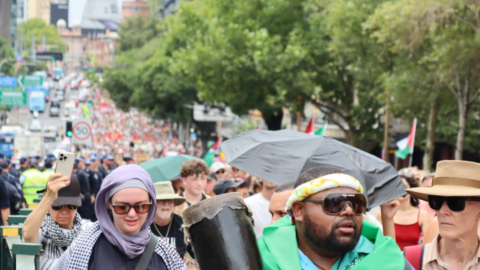
Beyond the dominant paradigm
Palestinian support was strong at Friday’s rally. Palestinians that spoke praised the solidarity the First Nations people of this land have shown since the 1948 Nakba, but also the solid backing they’ve provided since the current catastrophe was unleashed in early October.
All those on the ground on 26 January, whether Indigenous or non-Indigenous peoples, were clear that recent events, in particular the wholesale massacre for the land of Gaza, have reinforced the long-noted bias of the international systems of justice that serve to favour western colonising forces.
But the sands are shifting. The International Court of Justice ruled on Friday that as the South African case against Israel could hold, it must immediately stop genocidal acts. And people the globe over are calling for a different approach to life that doesn’t necessitate destruction of peoples and planet.
“In our way, there is room at the table for everyone. There is no hierarchy. Everybody is treated with respect. Everybody is welcome,” Coe said in conclusion, and she added that her people do need time “to heal, so we can come together and fight this fight with dignity – with our strength”.
“This is the legacy that our ancestors have left for us.”
